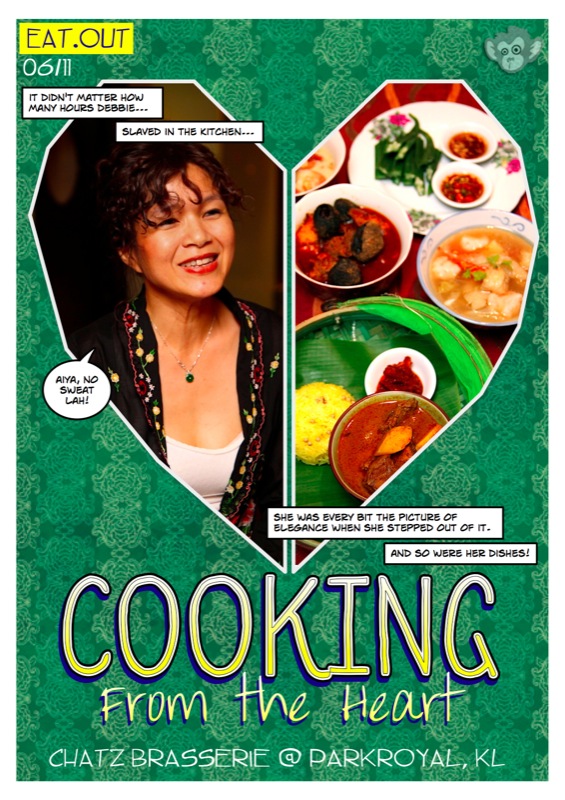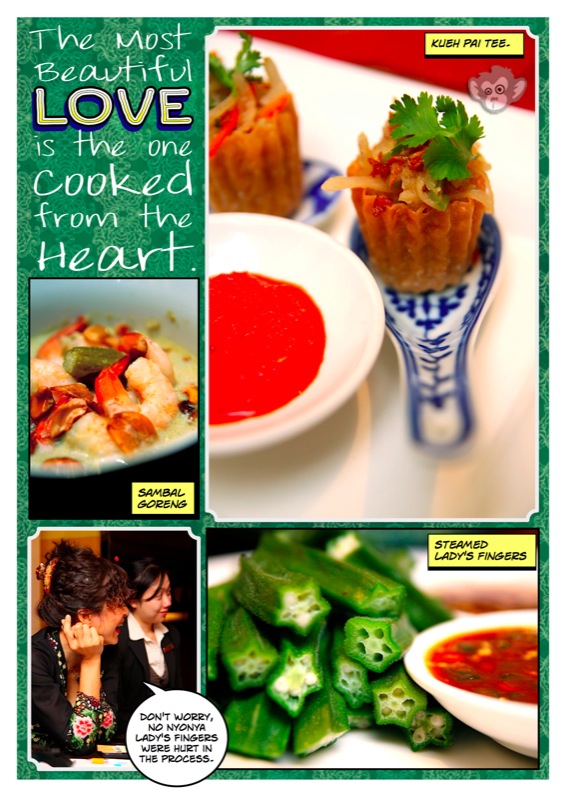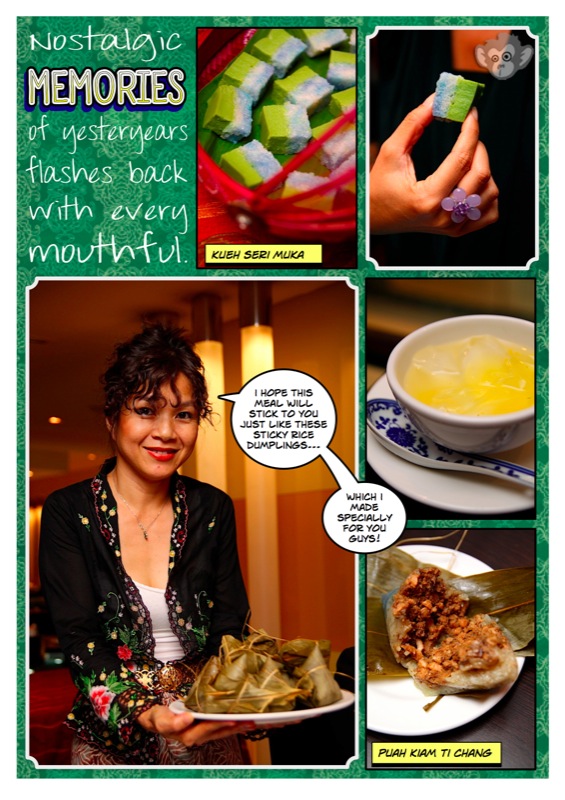
When I was a little boy, triangular indigo-and-white glutinous rice dumplings were an annual treat. Auntie Tan, my late god-mother, made these bamboo leaf-wrapped bundles to celebrate the Dragon Boat Festival. The festival is also known to the Chinese as Dunw Ji or Double Fifth as it is observed on the fifth day of every fifth lunar month and the custom of preparing and eating Stuffed Rice Dumplings (chung or zongzi ) is most associated with it.
In the past, zongzi were made in honour of the misunderstood and wrongly accused Chu Kingdom scholar, Qu Yuan (c. 340 BCE 278 BCE). When the warring state fell into the hands of the Qin army (whose leader was to become the first emperor of China), Qu Yuan wandered aimlessly. On the fifth day of the fifth moon, he came to the Miluo river with a weary and depressed heart at the fate of his beloved motherland. He sat down and composed a poem - the much celebrated Huai Sha - in which he poured out his grief. Then, in despair, he jumped into the river and drowned.
Dramatic, I know. But the Chinese have always loved a poet, and one who lived and died heroically for his country, stirs the imagination with the power of romance and melancholy beauty. When the poet's body could not be found, the surrounding villages threw rice-filled bamboo stems into the river to honour his soul. Hence, began the custom that survives until today.
Auntie Tan had her own version of telling this story, one that I would remember each time I sink my t! eeth int o these tender parcels. She told me that the rice was to feed the dragon in the river (according to ancient beliefs, the dragon ruled the waters and determined the distribution of clouds and rains) so it will not feast on the poet's body. Being the kid that I am, I would imagine myself as a fire-breathing dragon chomping away endlessly on these Nyonya chang. Of course, now I know the story was just a ploy to fatten me up - I was a scrawny kid back then. Auntie Tan made them using her family recipe, which has been passed down through generations. The Puah Kiam Ti Chang, as it's name suggest in peranakan Hokkien, is a sweet and savoury rice dumplings stuffed with a tiny chopped pieces of pork belly meat cooked with candied melon strips and spiced with coriander seed and cekur ginger root - which is significantly different from the Hokkien or Cantonese variations.
Today, Chinese the world over celebrates Duan Wu. But, it would never be the same without Auntie Tan's smile and dumplings. Oh, how I miss her.
***

Growing up in a nyonya household meant that its kitchen was my playground. My godmother, a nyonya from Penang and married to a southern Baba from Melacca, would laboriously work 8-hours a day in there while I run amuck around her. Must have drove her nuts. But I think, secretly, she knew that I was watching her every move at the corner of my eyes.
Clad in sarong and a heavily powdered face, she would bent down low in the kitchen's air-well pounding ingredients all morning in a tiny mortar. Come afternoon, she fills up the entire house
with a thick air of the most wonderful perfume and aroma, stirring up an appetite in my ! tiny bel ly. Fiery, spicy, flavorful and, most of all, full of wholesome love. Without knowing it back then, she gave me my first lessons at being a gourmand.
These days, finding a restaurant which serves traditional nyonya cooking is far and apart. In fact, it is a dying art due to its meticulous preparations and impossible hours - which turns off any young impatient cook. However, for those who can withstand the heat and master those skills, they grow into beautiful cooks. Such is the superpower of one Debbie Teoh, who effortlessly stood before us in a stunning black kebaya top with a sarong pants. Her face was perfectly made up with her curls elegantly tied up in a loose bun behind her porcelain face. Who would have imagined that this beautiful lady has actually been slaving away in the kitchen for the entire day?
Debbie Teoh, is a celebrated local food personality who wears many hats - she is a chef, foodie, author, food stylist, ambassador of the Nyonya cuisine and culture with over 15-years of experience in the F&B industry. A true-bred Nyonya who hails from Malacca comes from a line of inspiring cooks, it is no wonder she is such a natural when it comes to Peranakan cooking. She also contributes regularly to food magazines such as Flavours and Oriental Cuisine. And from now until 3rd July, Debbie is showcasing various Nyonya specialties for buffet lunch, dinner and high-tea during her stint as Chatz Brassarie's guest chef.

Expect specialties like dainty Kueh Paiti stuffed with crabmeat, prawns and julienned vegetables; the delicate flavours of the Hu Pioh T'ng or Fish Maw soup in English which has been boiled for over 2-nights; ! a simple Steamed Ladyfingers with extraordinary side dips like soy-sauce with fried garlic and the tau cheo (soy bean paste) with chopped chili and calamansi; a creamy and tangy Sambal Goreng made with tamarind, coconut milk, sourish blimbi or belimbing buloh (bamboo starfruit), and topped with chopped cashews.
If there is one dish which you absolutely must try, it has to be the Kari Buah Keluak Kay. Debbie's opium nut chicken curry is to die for. Authentic and meticulous, this dish resonates the lessons she has inherited from generations of sarong-clad ladies before her.Buah Keluak, as I found out, is actually the nut (some say it is the seed) of the Kepayang tree or Pangium Edule that grows wild in the Malay region. People say that the nut is poisonous and the hydrogen cyanide contained therein must be cleaned off properly. Traditionally to neutralize the poison, the nuts are prepared by burying with ash and then soaking in water for about a week.
When properly prepared (chopped and pounded finely, seasoned with salt and binded with egg white) the black kernel of this nut imparts a dark colour into the curry. The pitch-black meat of the seed is soft and oily, almost like opium (hence the name). It tastes a bit like a strong mushroom, with the barest repellant-yet-alluring hint of truffle. It's an acquired taste, but I've always liked it. It was a real treat to dig into them especially when eaten with Nasi Kunyit (steamed turmeric glutinous rice) and the oh-so-wonderful Sambal Kiam Hu (salted fish chili). If you're interested in the dish, please do enquire ahead for itsavailability to avoid anydisappointments.

De! ssert lo vers are not left out too. A selection of nyonya sweets are available daily, like the Seri Muka and O'giou Jelly which we sampled.
At the end of the preview session, Debbie surprised us with a platter of her signature Puah Kiam Ti Chang. I couldn't stop myself from indulging in them despite my protesting waistline. Her dumplings took me back to a more innocent time when life was as beautiful as the distinct blue of the bunga telang (butterfly pea flowers). Alas, this was not part of the promotion. And on that note, I'll end this post with a deep sense of appreciation to Debbie and the communications team at Parkroyal KL for the meal.
***
Chatz Brassarie
Parkroyal Kuala Lumpur,
Jalan Sultan Ismail,
50250 Kuala Lumpur.
Tel: +603-2782 8301
Note: For weekdays, the buffet lunch is priced at RM58++ per person and the buffet dinner is at RM78++ per person. During the weekend, the Nyonya selection is available for high tea at RM52++ per person. UOB, American Express and Standard Chartered credit card holders get a 20% discount promotion. A special Father's Day brunch is available at RM65++ per adult and RM32.50++ per child with a interactived children's cooking workshop. Nyonya dishes will also be available in the a la carte menu during the promotional period.
No comments:
Post a Comment